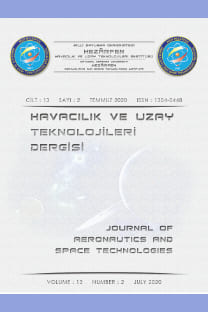Sensör verisi birleştirme teknikleri ve hedef izleme sistemine uygulanması
Data fusion techniques and target tracking application
___
- Çalışmalarındaki destek ve yardımlarından dolayı Hv.Mu.Ütğm. Ömer ÇETİN'e teşekkür ederim. [1]Mandic, D. Obradovic, D. Kuh, A. Adali, T. Trutschel, U. Golz, M. De Wilde, P. Barria, J. Constantinides, A. Chambers, J. 2005. Data Fusion For Modern Engineering Applications: An Overview, International Conference on Artificial Neural Networks, POLONYA.
- [2]Biroğul, S. Sönmez, Y. 2007, Neden Veri Füzyonu, Akademik Bilişim 2007 Dumlupınar Üniversitesi, Kütahya.
- [3]Hall, D.L, Llinas, J. 2001. Handbook of Multisensor Data Fusion, CRC Press, 537, USA.
- [4]Llinas, J. Bowman C. Rogova, G. Steinberg, A. Waltz, E. White, F. 2004. Revisiting the JDL Data Fusion Model, 7th International Conference on Information Fusion, Stockholm.
- [5]Esteban, J. Starr, A. Willets, R. Hannah, P. Cross, P. 2005. A Review of Data Fusion Models and Architectures: Towards Engineering Guidelines, Neural Computing&Applications, 273-281, London.
- [6]Klein, L.A. 2004. Sensor and Data Fusion a Tool for Information Assessment and Decision Making. SPIE Press, 324, Washington.
- [7]Teymur,C. 2008. Kural Tabanlı Karar Verme Sistemlerinde Belirsizliğin Modellenmesi, İTÜ Doktora Tezi, İstanbul.
- [8]Altrock, C. 1995. Fuzzy Logic&Neurofuzzy Applications Explained, Prentice Hall PTR, 350, New Jersey, USA.
- [9]Teker, A. Kuyumcu, F. 2007. Bulanık Mantık ve Kontrol Sistemleri, Elektrik-Elektronik-Bilgisayar Mühendisliği 12. ve Fuarı, Eskişehir.
- [10]Singh, P. Bailey, W.H. 1997. Fuzzy Logic Applications to Multisensor-Multitarget Correlation, Naval Air Warfare Centre, U.S.
- ISSN: 1304-0448
- Yayın Aralığı: 1
- Başlangıç: 2003
- Yayıncı: Dr. Öğr. Üyesi Fatma Kutlu Gündoğdu
Gözetleme/saldırı amaçlı mini insansız hava aracı tasarımı ve üretimi
A. Serkan AKGÜL, ABDURRAHMAN HACIOĞLU
İnsansız hava araçlarının genetik algoritma yöntemiyle çoklu hedeflere planlanması
Analysis of cooperative behavior for autonomous wide area search munitions
Türkçe metinden konuşma sentezlemede yaşanan sıkıntılar ve çözüm yöntemleri
Ş. Murat CANAL, Sefer KURNAZ, E. Egemen YILMAZ
The factors affecting non-linear dynamics of a special centrifugal adjuster
Dikey iniş-kalkış yapabilen dört rotorlu hava aracının (quadrotor) uçuş kontrolü
İ. Can DİKMEN, Aydemir ARISOY, HAKAN TEMELTAŞ
Sensör verisi birleştirme teknikleri ve hedef izleme sistemine uygulanması
Bir çevik yazılım geliştirme sürecinin uyarlanması ve uygulanması
Kadir ÇAMOĞLU, Derya AKBAYIR, FATİH YÜCALAR, HÜSEYİN FEHMİ SELİM BAYRAKLI
İş süreçlerinin modellenmesinde gert şebekelerinin kullanımı
